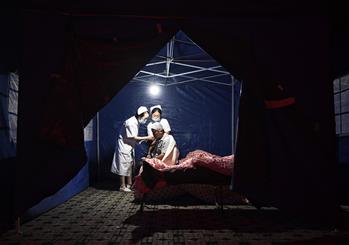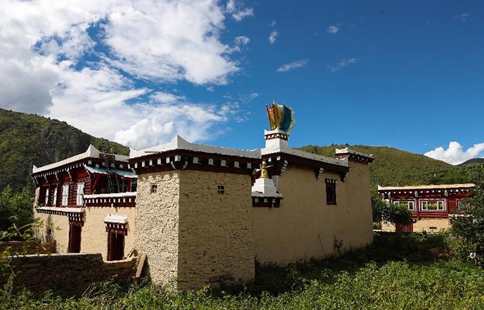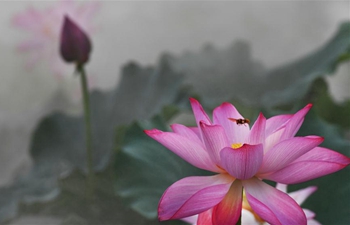
Huang Youliang, a former "comfort woman", stays at home in Yidui Village of Lingshui County, south China's Hainan Province, Aug. 2, 2017. Huang died at the age of 90 on Aug. 12. A total of 24 Chinese comfort women, including Huang, have attempted to sue the Japanese government in four cases since 1995, all have failed. Old age is taking the lives of "comfort women," a euphemism for girls and women forced into sex slavery by the Japanese during WWII. Across the Chinese mainland, only 14 comfort women are still alive, according to the Research Center for Comfort Women at Shanghai Normal University. And, some 400,000 women across Asia were forced to be "comfort women" for the Japanese army during WWII, and nearly half of them were Chinese, according to the Research Center for Comfort Women. (Xinhua/Yang Guanyu)
HAIKOU, Aug. 14 (Xinhua) -- Huang Youliang died before release of a documentary about her story, without receiving the justice and apology she had longed for for most of her lifetime.
As the documentary "Twenty-Two" featuring Chinese "comfort women" during the Second World War drew tears at cinemas on Monday, 90-year-old Huang lay in a wooden coffin in her son's living room.
Her funeral was held on Monday. On the table in Yidui Village, south China's Hainan Province, sat five bowls and a bottle of locally-made sweet potato wine, while her relatives and neighbors wept as they said goodbye.
Old age is taking the lives of "comfort women," a euphemism for girls and women forced into sex slavery by the Japanese during WWII.
Among the 22 women featured in the documentary, 14 have passed away since 2014. Across the Chinese mainland, only 14 comfort women are still alive, according to the Research Center for Comfort Women at Shanghai Normal University.
A week prior to Huang's death, Xinhua reporters visited her at her home to record the painful and unforgotten wartime history.
INCURABLE WAR SCARS
Huang lived in a small house. A wooden table, three plastic basins, a bowl, a pair of chopsticks, and a wheelchair covered with dust were among her few possessions. Weighing less than 40 kilograms, she was unable to get out of bed.
A three-month-old kitten given to her by a neighbor seemed to be the only sign of vitality in her room.
"I'm old and waiting for death. Death is inevitable," she said.
The ravages of WWII spread across the globe. Although the war ended more than 70 years ago, its ghosts linger on for some of its oldest, almost forgotten victims.
When Japanese troops invaded Huang's hometown in Hainan in 1941, the then 15-year-old girl was harvesting rice. The soldiers chased her back to her home, where they raped her.
They returned to her home every day. The scared girl hid at a neighbor's house. But when the soldiers beat and threatened her parents, Huang had no choice but come out of hiding.
Her nightmare did not end. She was later taken to a brothel where she forced to be a sex slave for Japanese soldiers for two years. Many women in her circumstances died of disease, abuse or suicide.
A villager lied to Japanese soldiers that Huang's father had died and request she be allowed to attend the funeral. Huang's family then set up two fake tombs, claiming that the girl had killed herself. They escaped and dared not return until the war ended.
Being forced to be comfort women was an unspeakable shame for many women. Huang married a leprosy patient who knew of her past but it was not a happy marriage.
UNFORGOTTEN HISTORY
Some 400,000 women across Asia were forced to be comfort women for the Japanese army during WWII, and nearly half of them were Chinese, according to the Research Center for Comfort Women.
Su Zhiliang, director of the center, said besides repeated sexual assaults, they were also forced to undertake manual labor.
The tragic chapter of Chen Liancun's life unfolded when her village were forced to mend roads by the Japanese army. Chen, a good-looking 13-year-old girl, was raped by soldiers most nights.
Chen, now 91, is still scared of Japanese, even those shown on TV dramas. Her son has had to move the television from her room.
The tragedies experienced by the comfort women are some of the worst crimes committed by Japanese military, Su said, "It was heinous and such crimes were rarely seen in human history."
When another surviving comfort woman, Wang Zhifeng, 92, was asked if she would accept an apology from descendants of those Japanese soldiers who hurt her, she said "I will. But I must tell them what their grandfathers or fathers have done."
However, even after 70 years, they have still not received one word of apology from the Japanese government for the massive violation of human rights.
A total of 24 Chinese comfort women, including Huang, have attempted to sue the Japanese government in four cases since 1995, all have failed.
Time is degrading the visible reminders of the atrocities. At the site of a "comfort station," one of the two rooms has collapsed, and walls of the other have been stripped. A three-meter-long crack extends from the foot of the wall to the second floor.
More than 20 kilometers away from this comfort station, Huang was buried in an open area near her home. The painful history will not disappear with her.















